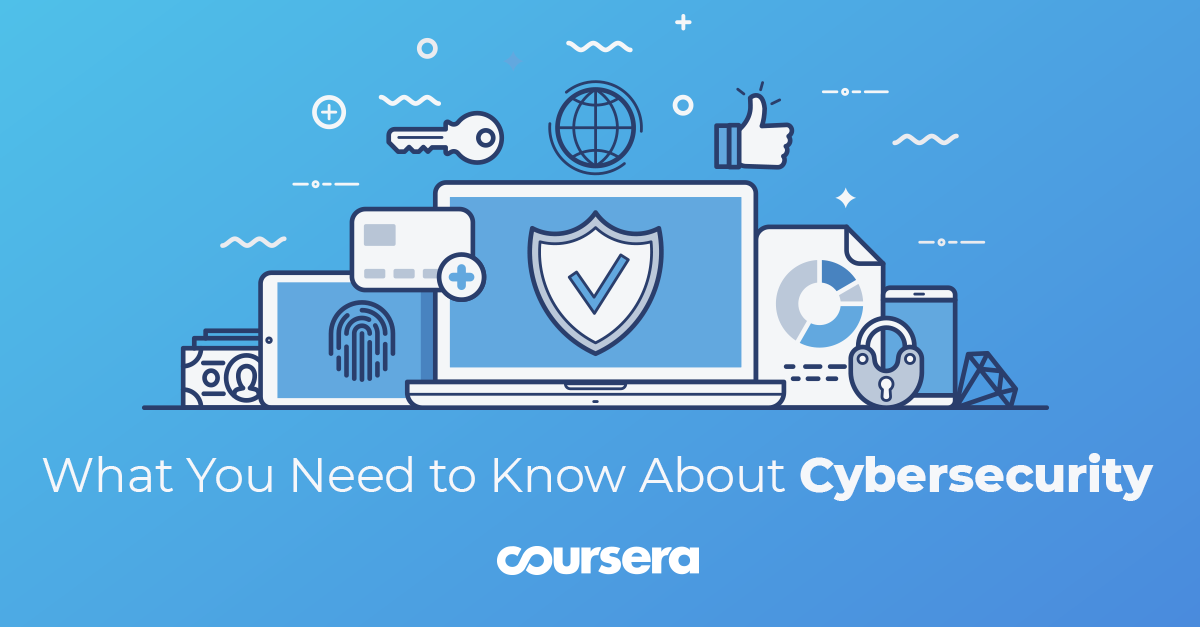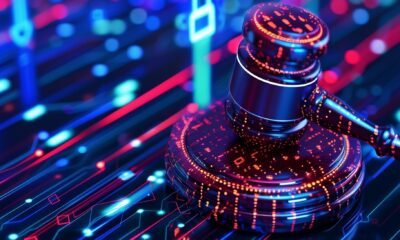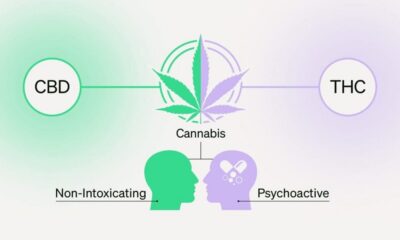Politics
What You Need To Know About Cybersecurity?

In today’s digital age, we are more connected than ever before. With the click of a button, we can access information and connect with people all over the world. While this interconnectedness has many benefits, it also comes with risks. As our lives move increasingly online, we become more vulnerable to cyber threats such as hacking, phishing, and identity theft. That’s why it’s important to be aware of cybersecurity risks and how to protect yourself from them. In this blog post, we will discuss what you need to know about cybersecurity. From common threats to tips for staying safe online, read on to learn more.
What is cybersecurity?
Cybersecurity, also known as information security, is the practice of protecting electronic information by mitigating information risks and vulnerabilities. Information risks can include unauthorized access, use, disclosure, interception, or destruction of data. Data can include, but is not limited to, the confidential information of business or individual users.
Unauthorized access is gained when an individual or entity accesses data without having proper authorization from the owner of the data. This type of access can often lead to data being intercepted or destroyed.
Use and disclosure of data can occur when authorized individuals or entities use data for purposes other than those for which it was intended. For example, an authorized individual may access customer financial records in order to commit fraud or identity theft. Alternatively, an authorized entity may disclose customer financial records to a third party without the customer’s consent or knowledge.
Interception of data can occur when someone unauthorized gains access to communications between two parties who are authorized to share the data. For example, an unauthorized individual may intercept email messages between a company and its customers.
Destruction of data can occur when someone unauthorized deletes or alters data without the permission of the owner of the data. For example, an attacker may delete critical files from a company’s servers in order to cripple its operations.
The Different types of cyberattacks
There are many different types of cyberattacks, but they can broadly be classified into four categories:
1. Denial-of-service (DoS) attacks
2. Malware attacks
3. Phishing attacks
4. SQL injection attacks
Denial-of-service (DoS) attacks: A DoS attack is an attempt to make a computer or network resource unavailable to its intended users. This can be done by flooding the target with traffic, overwhelming it with requests, or crashing it with malicious code. DoS attacks are often used as a way to take down websites or online services for political or ideological reasons.
Malware attacks: Malware is short for “malicious software” and refers to any kind of software that is designed to harm a computer or its users. Malware can be used to steal sensitive information, hijack computers, and even delete important files. Common types of malware include viruses, worms, Trojans, and spyware.
Phishing attacks: Phishing is a type of social engineering attack in which the attacker tries to trick the victim into giving them sensitive information such as passwords or credit card numbers. The attacker will typically send an email that appears to be from a legitimate company or institution, asking the recipient to click on a link and enter their personal information on a fake website.
SQL injection attacks: SQL injection is a type of attack in which malicious code is injected into a website’s database. This can allow the attacker to access sensitive information, make changes to the data, or even delete it altogether. SQL injection is one of the most common types of attacks on websites and can be very difficult to detect and prevent.
How to protect yourself from a cyberattack?
There are a few key things you can do to protect yourself from a cyberattack. First, make sure your computer’s security software is up to date. This will help block known threats and give you a better chance of catching anything new. Next, be careful about what you click on and download. Stick to trusted websites and avoid clicking on links in email or social media messages from people you don’t know. Finally, keep your personal information private. Don’t sharing passwords or financial information online or over the phone unless you’re absolutely sure it’s safe to do so.
What to do if you are a victim of a cyberattack?
If you are the victim of a cyberattack, there are a few things you can do to try and mitigate the damage. First, if you have not already done so, you should update your antivirus software and run a scan of your system. This may help to identify and remove any malware that has been installed on your system as part of the attack.
Next, you should change any passwords that may have been compromised as part of the attack. Be sure to use strong, unique passwords for all of your online accounts. You may also want to consider using a password manager to help keep track of your passwords and make them more secure.
Finally, you should contact your bank or credit card companies if you believe any of your financial information may have been compromised in the attack. They will be able to help you take steps to protect your account and prevent any further unauthorized charges.
Cybersecurity tips for businesses
As the world becomes increasingly digitized, cybersecurity is more important than ever for businesses. Here are some tips to help you keep your business safe from cyber attacks:
1. Train your employees in cybersecurity best practices.
2. Implement strong security measures, such as two-factor authentication and data encryption.
3. Regularly back up your data.
4. Monitor your network for suspicious activity.
5. Educate yourself and stay up-to-date on the latest cybersecurity threats.
Conclusion
As the world becomes more and more reliant on technology, it’s important to be aware of the cybersecurity risks that come with it. By understanding what cybersecurity is and how it works, you can help protect yourself and your loved ones from becoming victims of cybercrime. Stay safe out there.
Politics
The Ultimate Guide to Menx’k Rxxp Qiurezok in 2025

Introduction
The digital landscape evolves at breakneck speed, introducing concepts that reshape how we approach creativity and productivity. One emerging framework capturing attention across tech circles is menx’k rxxp qiurezok a methodology that bridges structured thinking with creative innovation.
This comprehensive guide explores everything you need to know about menx’k rxxp qiurezok, from its foundational principles to practical applications across industries. You’ll discover how this approach can enhance your workflows, boost productivity, and unlock new possibilities for digital innovation.
Whether you’re a developer, marketer, creator, or entrepreneur, understanding menx’k rxxp qiurezok could give you a competitive edge in an increasingly automated world.
What Is Menx’k Rxxp Qiurezok?
The Foundation of Hybrid Intelligence
Menx’k rxxp qiurezok represents a systematic approach that combines digital creativity with structured intelligence. Rather than forcing a choice between rigid automation and pure human creativity, this framework creates a synthesis that leverages the strengths of both.
The concept emerged from collaborative efforts between developers and creative professionals who recognized the limitations of purely automated solutions. They sought a middle ground that could maintain efficiency while preserving the nuance and innovation that human input provides.
At its essence, menx’k rxxp qiurezok operates on three core principles:
- Structured flexibility: Creating frameworks that guide without constraining
- Human-AI collaboration: Balancing automated efficiency with creative insight
- Adaptive scaling: Systems that grow and evolve with user needs
Origins and Evolution
The framework first appeared in underground tech communities around 2023, where developers and artists collaborated on hybrid digital tools. These early pioneers recognized that traditional workflows often created silos between creative and technical teams.
As remote work expanded and AI tools became more sophisticated, the need for frameworks that could bridge these gaps became apparent. Menx’k rxxp qiurezok evolved from these collaborative experiments into a more formal methodology.
The approach gained traction as teams discovered they could maintain creative quality while dramatically improving efficiency. Unlike rigid automation systems, menx’k rxxp qiurezok preserves space for intuition, experimentation, and human judgment.
Why Menx’k Rxxp Qiurezok Matters in 2025
Industry Adoption Accelerates
Multiple industries have begun implementing menx’k rxxp qiurezok principles to address modern workflow challenges. The approach offers particular value in environments where creativity and efficiency must coexist.
Digital marketing teams use these principles to balance data-driven insights with creative campaign development. Software development teams apply the framework to manage technical requirements while fostering innovation. Content creators leverage the methodology to streamline production without sacrificing originality.
The framework’s growing popularity stems from its ability to address common pain points:
- Automation that lacks nuance
- Creative processes that lack structure
- Team workflows that create bottlenecks
- Systems that don’t scale effectively
Measurable Benefits
Organizations implementing menx’k rxxp qiurezok report significant improvements across multiple metrics:
Productivity gains: Teams typically see 30-50% improvements in output quality and speed when properly implementing the framework.
Enhanced collaboration: The visual and structured nature of the approach helps teams communicate more effectively across disciplines.
Reduced friction: By creating clear frameworks for human-AI collaboration, teams spend less time on coordination and more time on value creation.
Scalable growth: The adaptive nature of the system means it remains effective as teams and projects expand.
How Menx’k Rxxp Qiurezok Works
Core Operating Principles
The framework operates through three interconnected layers that work together to optimize both creative and technical processes.
Layer 1: Structured Logic
This foundation provides the roadmap for any project or workflow. Rather than rigid rules, it establishes flexible guidelines that can adapt to specific needs. The structure ensures consistency and efficiency while leaving room for creative interpretation.
Layer 2: Creative Flexibility
Built on top of the logical structure, this layer introduces controlled variability. It’s where human insight, artistic vision, and innovative thinking can flourish within the established framework. This prevents the sterile outcomes often associated with purely automated systems.
Layer 3: Adaptive Intelligence
The top layer monitors and adjusts the system based on outcomes and feedback. This creates a learning system that improves over time, becoming more aligned with user needs and project goals.
Essential Tools and Techniques
Implementing menx’k rxxp qiurezok effectively requires a carefully chosen toolkit that supports both structured workflows and creative flexibility.
Workflow Management: Platforms like Notion, Trello, or Monday.com provide the structural foundation for organizing projects and tracking progress.
AI Integration: Tools like ChatGPT, Claude, or specialized AI platforms handle routine tasks and provide creative starting points.
Automation Connectors: Services like Make.com or Zapier link different tools together, creating seamless workflows that reduce manual work.
Creative Suites: Adobe Creative Cloud, Figma, or other design tools maintain the creative component of the workflow.
The key lies not in any individual tool, but in how these components work together to create a cohesive system that serves both efficiency and creativity.
Practical Applications Across Industries
Digital Marketing Revolution
Marketing teams face constant pressure to produce high quality content at scale while maintaining personalization and brand voice. Menx’k rxxp qiurezok provides a framework for balancing these demands.
Content planning becomes more strategic when AI tools generate initial ideas and research, while human marketers provide strategic direction and brand alignment. Campaign development can leverage automated data analysis while preserving the creative insights that make campaigns memorable.
Social media management exemplifies this balance. Automated scheduling and basic content generation handle routine posts, while human oversight ensures brand consistency and responds to emerging trends or conversations.
Creative Content Development
Artists, designers, and content creators use menx’k rxxp qiurezok to enhance rather than replace their creative processes. The framework helps organize inspiration, streamline production workflows, and manage client relationships.
Design projects benefit from AI-assisted mood board creation and concept development, while human designers provide artistic vision and client communication. Writers can use AI for research and initial drafts, then apply their expertise for voice, style, and strategic messaging.
The approach proves particularly valuable for agencies managing multiple clients and projects simultaneously. The structured framework ensures consistency across projects while the creative flexibility maintains unique brand voices.
Software Development Enhancement
Development teams implement menx’k rxxp qiurezok to balance technical requirements with user experience considerations. The framework helps bridge the gap between functional specifications and intuitive design.
Project planning incorporates AI-assisted feature analysis and timeline estimation, while human developers provide technical insight and architectural decisions. Code review processes can leverage automated testing and analysis tools while maintaining human oversight for complex logic and user experience considerations.
User interface development particularly benefits from this hybrid approach. AI tools can generate initial designs and variations, while human designers ensure usability and brand alignment.
Small Business Operations
Smaller organizations often lack resources for specialized teams, making menx’k rxxp qiurezok particularly valuable for maximizing limited resources.
Customer service operations can automate routine inquiries while ensuring human oversight for complex issues. Marketing efforts can leverage AI for content creation and audience analysis while maintaining personal touches that build customer relationships.
Administrative tasks benefit from structured automation while preserving flexibility for unique situations that small businesses often encounter.
Expert Strategies for Success
Start Simple, Scale Systematically
The most successful menx’k rxxp qiurezok implementations begin with small, manageable projects that demonstrate value before expanding to more complex applications.
Choose one workflow or process that currently creates friction in your organization. Apply the basic principles of structured flexibility and human-AI collaboration to that specific area. Measure results and gather feedback before expanding to additional processes.
This approach prevents overwhelming team members while building confidence in the methodology. It also allows for refinement and customization based on your specific organizational needs.
Balance Automation with Human Insight
The most common mistake in implementing menx’k rxxp qiurezok is over-relying on automation at the expense of human judgment. The framework’s power comes from thoughtful integration, not wholesale replacement of human processes.
Identify which tasks benefit most from automation—typically routine, repetitive work that follows clear patterns. Preserve human involvement in areas requiring judgment, creativity, or complex problem-solving.
Regular review and adjustment ensure the balance remains appropriate as both technology and team capabilities evolve.
Build Community and Learning
Successful implementation often depends on team buy-in and continuous learning. Create opportunities for team members to share experiences, challenges, and discoveries related to menx’k rxxp qiurezok implementation.
Online communities, industry forums, and peer networks provide valuable resources for troubleshooting challenges and discovering new applications. The methodology continues evolving, making ongoing learning essential for maximizing benefits.
Documentation of successes, failures, and lessons learned creates institutional knowledge that improves future implementations.
Monitor and Optimize Continuously
Menx’k rxxp qiurezok works best as a dynamic system that adapts based on performance data and user feedback. Establish metrics that measure both efficiency gains and creative output quality.
Regular review cycles help identify areas where the balance between structure and flexibility needs adjustment. User feedback reveals pain points and opportunities for improvement that might not be apparent from metrics alone.
The most effective implementations treat menx’k rxxp qiurezok as an evolving system rather than a fixed solution.
Common Implementation Pitfalls
Over-Automation Trap
Many organizations mistake menx’k rxxp qiurezok for a pure automation strategy, leading to sterile outputs that lack the human touch customers and users expect.
Successful implementation maintains human involvement in key decision points, creative direction, and quality assessment. Automation should enhance human capabilities rather than replace human judgment entirely.
Signs of over-automation include declining customer satisfaction, reduced team engagement, and outputs that feel generic or impersonal.
Ignoring User Experience
Another frequent mistake involves focusing solely on internal efficiency while neglecting the end-user experience. Menx’k rxxp qiurezok should improve both internal processes and external outcomes.
Regular user feedback and experience testing ensure that efficiency gains don’t come at the expense of user satisfaction. The most successful implementations create better experiences for both internal teams and external users.
Insufficient Change Management
Implementing menx’k rxxp qiurezok often requires significant changes to established workflows and roles. Organizations that underestimate the change management component often struggle with adoption and effectiveness.
Successful implementation includes training, clear communication about benefits and expectations, and support for team members adapting to new processes.
Frequently Asked Questions
What exactly is menx’k rxxp qiurezok?
Menx’k rxxp qiurezok is a framework that combines structured workflows with creative flexibility, using both human insight and AI capabilities to optimize processes while maintaining quality and innovation.
Is it a tool or a methodology?
It’s primarily a methodology or approach rather than a specific tool. The framework guides how you use and combine various tools to create more effective workflows.
Can beginners implement this successfully?
Yes, the framework is designed to be accessible to beginners. Starting with simple applications and gradually expanding complexity allows teams to build competency over time.
Do you need technical expertise to use menx’k rxxp qiurezok?
While technical knowledge can be helpful, many applications require minimal technical expertise. Many tools used in menx’k rxxp qiurezok implementations are designed for non-technical users.
How do you measure success with this approach?
Success metrics typically include productivity improvements, quality maintenance or enhancement, user satisfaction, and team engagement. The specific metrics depend on your particular application and goals.
Building Your Menx’k Rxxp Qiurezok Future
The landscape of work continues evolving rapidly, with AI capabilities expanding and remote collaboration becoming the norm. Menx’k rxxp qiurezok offers a framework for navigating this complexity while maintaining the human elements that create truly valuable outcomes.
Organizations that master this balance will find themselves better positioned to compete in an increasingly automated world. The key lies not in choosing between human creativity and AI efficiency, but in thoughtfully combining both to create something greater than either could achieve alone.
The framework’s emphasis on adaptability ensures it can evolve alongside technological advances and changing business needs. Early adopters gain the advantage of building competency with these principles before they become standard practice across industries.
Success with menx’k rxxp qiurezok requires patience, experimentation, and commitment to continuous improvement. The investment in learning and implementing these principles pays dividends in improved efficiency, enhanced creativity, and more satisfied teams and users.
Whether you’re leading a large organization or working as an individual contributor, understanding and applying menx’k rxxp qiurezok principles can enhance your effectiveness and prepare you for the future of work.
Politics
Anurag Bajpayee: The Engineer Bringing Industrial Water Use Into the 21st Century

In a world grappling with the twin pressures of climate change and rapid industrialization, water has become both a strategic resource and a mounting challenge. For industries that rely heavily on it—from semiconductors to pharmaceuticals—the question is no longer simply one of supply, but of sustainability and reuse. At the center of a growing movement to reengineer the way water is treated and recycled stands Anurag Bajpayee, an engineer and entrepreneur whose company, Gradiant, is gaining global attention for its practical solutions to one of the century’s most urgent environmental concerns.
Bajpayee earned his bachelor’s degree from the University of Missouri-Columbia in 2006 and went on to pursue graduate work at the Massachusetts Institute of Technology (MIT), where he completed a master’s and Ph.D. in mechanical engineering.
It was during his time at MIT that Bajpayee began working on what would become the foundation for his later career. His research focused on thermal and membrane-free desalination techniques—technologies aimed at extracting clean water from complex sources without the high energy costs typically associated with conventional methods. One of his innovations, a process known as Carrier Gas Extraction (CGE), mimicked natural evaporation and condensation cycles to purify water efficiently. This technology was recognized by Scientific American in 2012 as one of the “Top 10 World-Changing Ideas.”
In 2013, Bajpayee co-founded Gradiant with fellow MIT alumnus Prakash Govindan. The company emerged as an MIT spinout with a mission to develop industrial-scale water treatment solutions based on advanced engineering principles. Gradiant’s focus has been on industries facing high water stress or stringent environmental regulations, offering systems that allow factories and plants to recycle wastewater on-site rather than discharge it or rely on freshwater withdrawals.
Gradiant’s growth over the past decade has mirrored rising global concerns about water scarcity. With operations now spanning the United States, China, Southeast Asia, and the Middle East, the company has built treatment plants across sectors including semiconductors, pharmaceuticals, food and beverage, energy, and mining.
Its clients include some of the world’s largest corporations. In Texas, Gradiant provides water reuse technologies to a semiconductor facility located in a drought-prone region. In China, it works with biopharmaceutical producers to ensure wastewater is treated and recycled to rigorous purity requirements.
One of Gradiant’s core offerings is a portfolio of proprietary technologies—developed in-house and backed by over 280 patents—ranging from advanced reverse osmosis to selective contaminant extraction and brine concentration systems. These tools enable customers to recover up to 98% of water from wastewater streams, a significant improvement over traditional methods.
The company has also gained traction among investors. In 2023, Gradiant raised $225 million in a Series D funding round, boosting its valuation to $1 billion.
Despite its commercial momentum, Bajpayee maintains that Gradiant is first and foremost an engineering firm focused on practical problem-solving. The company not only develops but also builds and operates water treatment infrastructure for its clients, offering a vertically integrated model that gives it greater control over performance and reliability.
This emphasis on engineering execution, rather than simply licensing technology, has helped distinguish Gradiant in a crowded market. Bajpayee has noted that while there are many good ideas in water treatment, the challenge lies in scale, reliability, and economics.
Bajpayee’s leadership has been widely recognized within the water industry. In 2019, he was named to MIT Technology Review’s annual list of Innovators Under 35 in the entrepreneur category. Gradiant has been named Desalination Company of the Year by Global Water Intelligence and received the Water Technology Idol award at the Global Water Summit in 2023. Its growing patent portfolio and global project base have earned it a reputation as a “water unicorn” within the climate-tech sector.
Yet Bajpayee himself remains focused on the long game. As water stress intensifies globally—due to both rising consumption and unpredictable climate patterns—he sees industrial water reuse as not just a technical solution, but a necessary evolution in how industries operate.
Looking ahead, Gradiant aims to expand further into emerging markets, where rapid industrialization is outpacing infrastructure. The company is also developing AI-driven systems for real-time water quality monitoring and predictive maintenance, as part of a broader push toward digital transformation in environmental services.
Bajpayee, who now splits his time between Boston, Middle East, Europe and Asia, continues to steer the company’s global strategy while staying involved in technical development. His background as both a scientist and an entrepreneur allows him to navigate the demands of innovation and execution—an increasingly rare combination in a field often divided between lab and boardroom.
At a time when the world’s freshwater systems are under growing strain, Bajpayee’s work sits at the intersection of environmental necessity and industrial efficiency. Whether Gradiant will become the dominant water tech company of its generation remains to be seen, but the approach it represents—of engineering-led, solution-focused sustainability—is already shaping how industries confront one of their most critical challenges
Politics
Elizabeth Fraley Kinder Ready Reviews Top 12 Television Shows for Best Suited for Children

In the 21st century, technology has integrated almost every aspect of our lives. From transport to entertainment, from offices to health, every branch of our life fully incorporates technology and innovation.
Similarly, although parents are (rightfully so) hesitant in using technology around their children, Elizabeth Fraley Kinder Ready has compiled a list of television shows for children that can boost learning skills and cognitive development. Emotional intelligence is just as important as academics; shows that improve such skills need to be appreciated.
Following is a list of educational television shows for children, by Elizabeth Fraley Kinder Ready:
Bluey
Optimum Age: 3 to 7
Bluey is an Australian animated series that promotes creativity and emotional intelligence. The titular character, Bluey, is a blue heeler pup. This series navigates around her everyday life with family. This television show reinforces the values of family, love and teamwork.
Dora the Explorer
Optimum Age: 2 to 7
This television show greatly influences the learning capability of your child. The daily challenges and puzzles the main character faces, help the audience i.e. the children to hone their problem solving skills as well as memory skills. If you’re bilingual and want to incorporate Spanish in your child’s life, this show is definitely a must.
Peppa Pig
Optimum Age: 2 to 6
This family-oriented television show will reinforce home values. This series follows Peppa pig and her family engaging in normal everyday activities; in a way that teaches the children about manners, social skills, friendship and the importance of family.
Sesame Street
Optimum Age: 2 to 5
Next on the list by Elizabeth Fraley Kinder Ready is Sesame Street; one of the leading shows that encourage learning, ranging from numbers to social skills. Originally aired in the 1970s, this show uses a slow-paced format that is perfect for your child’s cognitive development.
Numberblocks
Optimum Age: 3 to 7
This show is ideal to hone your child’s math skills. It incorporates basic math concepts like counting, addition and subtraction in a fun way.
Mister Rogers’ Neighbourhood
Optimum Age: 3 to 8
This television show follows Fred Rogers as he teaches children about emotional intelligence and life lessons. Labelled as a “timeless classic”, this show develops the feelings of empathy, kindness and confidence in children.
Paw Patrol
Optimum Age: 2 to 5
This enthralling show follows a group of rescue puppies as they band together to save their neighborhood from impending threats and dangers. Paw Patrol fosters teamwork as well as problem solving skills in its viewers.
WordWorld
Optimum Age: 2 to 6
This television show encourages learning through visual aids, focusing on spelling development and phonics. One of the most interesting things about this show is that everything is made up of letters and alphabets. For example, a nest is depicted as N E S T, laid out. Elizabeth Fraley Kinder Ready believes that shows like this are of a great help in your child’s learning journey.
The Magic School Bus
Optimum Age: 5 to 10
For slightly older children, this television show inspires curiosity and critical thinking. It follows Ms. Frizzle and her students as they take field trips related to science, in an effort to explain how things, like the human body and ecosystems, work.
Curious George
Optimum Age: 3 to 10
If your child is fascinated by science or STEM, this show is a must-watch. It promotes critical thinking skills and elaborates basic physics and engineering concepts, in a fun way.
Super Why!
Optimum Age: 3 to 6
This television show consists of superhero characters who emphasize spelling and phonics in an interactive way. This show also hones reading skills of children, allowing them to identify correct sounds.
Wild Kratts
Optimum Age: 4 to 10
Last in the list by Elizabeth Fraley Kinder Ready is Wild Kratts. This television show follows the Kratt brothers as they explore wildlife habitats and ecosystems. This encourages a passion for life sciences and ecology in children.
Conclusion
Elizabeth Fraley Kinder Ready, CEO of educational service company, emphasizes on the need for parents to regulate what type of media their children consume.
Television shows provide more than just entertainment – they can be a great source of education too! Whether it is academics like math skills and reading or values like empathy, confidence, television shows provide a strong foundation of learning.
For further details on Kinder Ready’s programs, visit their website: https://www.kinderready.com/.
Youtube Channel: https://www.youtube.com/@ElizabethFraleyKinderReady
-

 Technology3 years ago
Technology3 years agoIs Camegle Legit Or A Scam?
-

 Travel3 years ago
Travel3 years agoNEW ZEALAND VISA FOR ISRAELI AND NORWEGIAN CITIZENS
-

 Technology3 years ago
Technology3 years agoRNDcoin: Korea’s first blockchain project and a world-class cryptocurrency
-

 Uncategorized3 years ago
Uncategorized3 years agoAMERICAN VISA FOR NORWEGIAN AND JAPANESE CITIZENS
-

 Fashion1 year ago
Fashion1 year agoGoda Perfume Reviews: Is It Worth Your Investment?
-
Lifestyle1 year ago
A Guide to Silverdaddies: What You Need to Know
-

 Health3 years ago
Health3 years agoHealth Benefits Of Watermelon
-

 Home Improvement8 months ago
Home Improvement8 months agoArtificial Grass Designs: Perfect Solutions for Urban Backyards

















